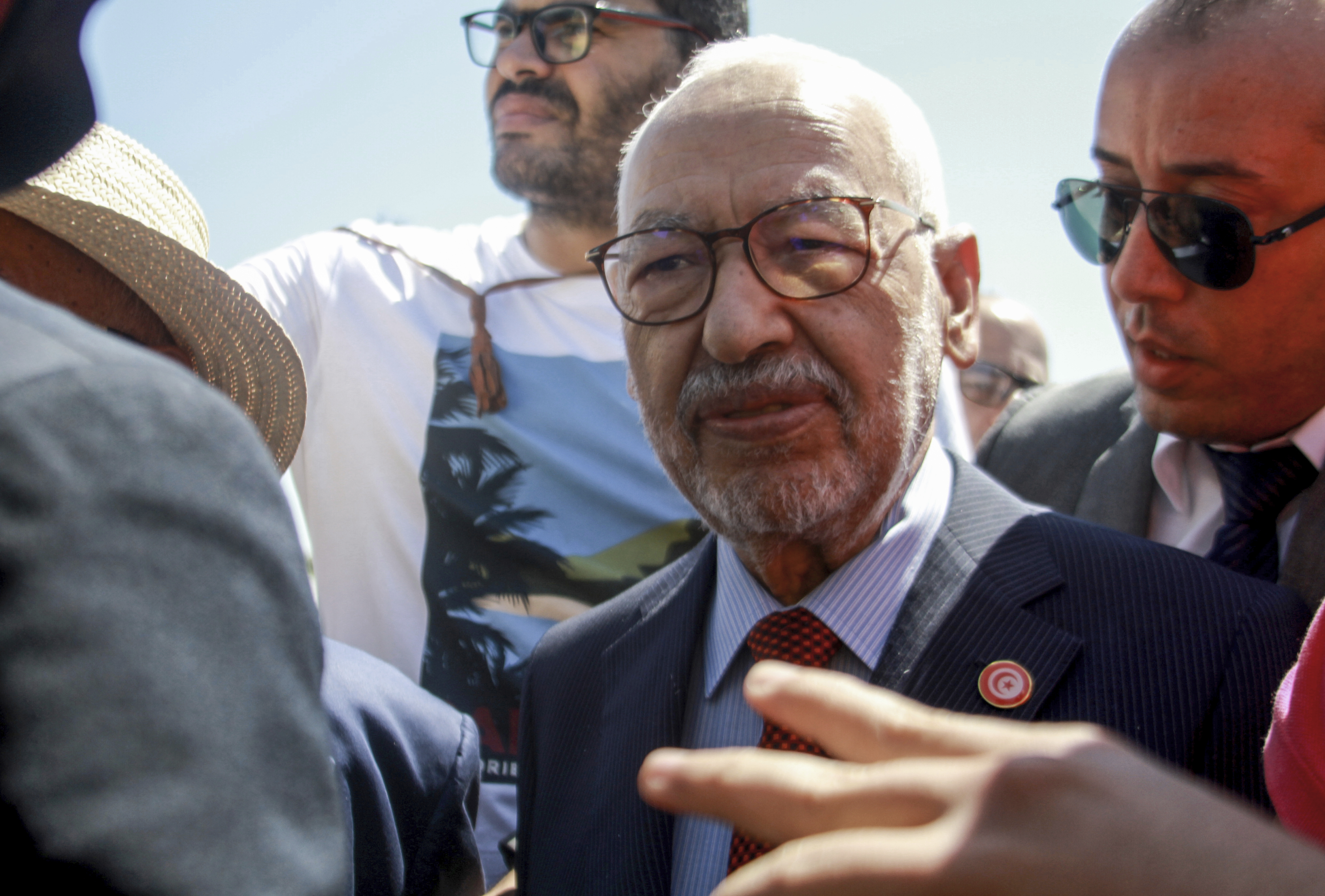
Rached Ghannouchi, a prominent opposition leader in Tunisia and the former speaker of the country’s parliament, has begun a three-day hunger strike behind bars, in solidarity with a fellow political prisoner and head of the opposition coalition National Salvation Front, Jaouher Ben Mbarek.
Ghannounchi has been imprisoned since last April on charges of incitement and plotting against state security, which the opposition figure and his supporters say are baseless. He is a fierce critic of President Kais Saied.
The president has been accused by the opposition of increasing authoritarianism and staging a coup when he dissolved parliament and dismissed the government in July 2021, governing by decree since.
The 82-year-old Ghannouchi, who is the head of Tunisia’s self-described “Muslim Democrat” Ennahdha party, was parliament speaker from the 2019 election until Saied sent tanks to shut down the chamber in 2021.
He was sentenced in absentia to one year in prison in May, as he refused to appear before the judiciary, rejecting what he said were fabricated political trials.
#Ennahdha Statement: @R_Ghannouchi on hunger strike in solidarity with Jaouhar Ben Mbarek and other political prisoners#Tunisia https://t.co/H3fe9eLYD4 pic.twitter.com/tbf9oAP1Qf
— Ennahdha Party (@EnnahdhaParty) September 29, 2023
A statement by Ennahdha on Friday said Ghannounchi has begun a hunger strike demanding the release of all political prisoners and “ending the injustice against them”.
The statement expressed its solidarity with Ghannounchi and Jaouher Ben Mbarek, the head of the opposition coalition National Salvation Front, who began his own hunger strike four days ago, and held the authorities responsible for “any harm caused to the health and safety of the prisoners on hunger strike”.
It also said that most of the political prisoners have been imprisoned by the “coup authorities” without trial or interrogated in “fabricated cases whose only motive is to eliminate political rivals who oppose it”.
Ben Mbarek has spent more than seven months in pre-trial detention, his lawyer Dalila Msaddek said.
His hunger strike is in protest of the “judicial farce led by the investigative judge at the antiterrorism division”, Msaddek said in a Facebook post.
Police have arrested more than 20 political figures this year, including Ghannouchi, accusing some of plotting against state security. Among the arrested are lawyers, businessmen, and the head of a popular radio station known for giving a platform to criticism of the president.
Ghannouchi’s lawyer said the charges against him stem from a funeral eulogy he gave last year for a member of his Ennahdha party when he said the deceased “did not fear a ruler or tyrant [and] only feared God”.
‘Free Ghannouchi’ an online campaign calling for the release of the opposition leader, also released a statement on Friday holding Saied “fully responsible for the consequences of the strike on the health of… Ghannouchi”.
“Going on hunger strike for the sake of freedom and dignity for all political prisoners is not a novelty for Rached Ghannouchi, who has spent more than four decades struggling for freedom, justice and other noble human values,” the statement added.
Ghannouchi’s career as a leading politician was also referenced by Monica Marks, a professor of Middle East Politics at NYU Abu Dhabi, and a leading expert on Tunisia.
“Scholars are hard-pressed to name an Arab thinker who has argued more passionately for Islam’s compatibility [with] democracy than Rached Ghannouchi,” Marks wrote on social media.
Saied, who enshrined his new powers in a constitution that passed through a controversial referendum with low turnout last year, has denied his actions were a coup and said they were needed to save Tunisia from years of chaos.
He has called his critics criminals, traitors and “terrorists” and warned that any judge who freed them would be considered abetting them.
Prior to the 2011 uprising that removed former longtime leader Zine El Abidine Ben Ali from power, Ghannouchi spent more than 20 years in exile in the British capital London.
He returned to Tunisia in January 2011 to a triumphant welcome, and in October of that year, Ennhadha won 37 percent of the vote in the parliamentary elections – the largest party win.
The party repeatedly performed strongly in elections until Saied’s 2021 power-grab, and has since boycotted elections, along with the majority of the country’s opposition.







